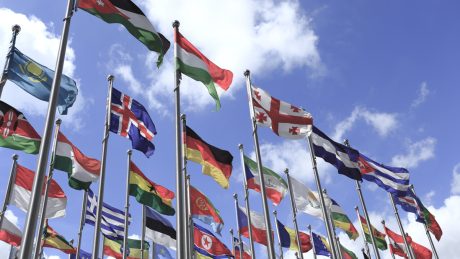Family arbitration is a form of non-court dispute resolution (NCDR) that generally mimics the structure of court proceedings. In this article, associates Olamidé Nakou and Sophie Parris compare how different jurisdictions approach arbitration in family matters.
Arbitration’s popularity and growth in family disputes is straightforward to explain. Not only does it provide a private forum in which to resolve disputes, away from the risk of publicity and press intrusion, it also offers a significantly quicker process than that which is experienced in court – often saving more than 50% of the time involved. As arbitration is not shackled to the court opening times, it can be agreed and scheduled to take place in any location and at any time, making it ideal for internationally mobile families as well as those with incredibly busy lives. Details of how arbitration works and the key advantages of this form of NCDR can be found in our article here.
Whilst family arbitration, or other forms of private court offering, are becoming far more common across the world, there are differences from jurisdiction to jurisdiction, and this article takes a closer look at several jurisdictions to provide a flavour of how separating couples may be able to consider arbitration.
England and Wales
The arbitration model in England and Wales is well established and increasingly popular, especially with high net worth and ultra-high worth individuals. In this jurisdiction, parties have a duty to attempt NCDR before issuing proceedings and throughout proceedings. The same duties of disclosure apply in arbitration as if court proceedings were afoot (see ON v ON [2024] EWFC 379).
Family arbitration in England and Wales can be used to resolve a wide range of financial disputes and disputes concerning children, provided those involved agree to resolve the dispute in this way. Parties can rest assured that in England, family law arbitrators are skilled legal experts who have a duty to ensure that the substantive law is applied in cases before them as it would be were the matter before the court. It is, therefore, an effective alternative to court proceedings.
What family disputes can be arbitrated in England?
Financial disputes
The Family Law Arbitration Financial Scheme (the “Financial Scheme’”) is a scheme under which financial or property disputes with a family background may be resolved by arbitration. The Financial Scheme covers financial and property disputes arising from:
- Marriage and its breakdown,
- Civil partnership and its breakdown, and
- Co-habitation and the ending of co-habitation.
Children disputes
The Family Law Arbitration Children Scheme is a scheme under which private law children disputes may be resolved by arbitration. The wide range of matters that can be arbitrated include:
- The exercise of parental responsibility,
- The present or future welfare of a child,
- Living arrangements for a child,
- Contact with a child,
- Education of a child,
- Religion of a child,
- Routine medical treatment (i.e. non-life-threatening medical treatment), and
- Applications to remove a child from England and Wales (whether permanently or temporarily).
The opportunity to resolve family disputes through arbitration is not universal; different jurisdictions have different approaches. These are explored below.
United States
Whilst most US states provide for a form of arbitration (or private court offering) for both financial and children’s matters, there are exceptions, and each state has its own laws and regulations in this regard. For example, in Florida, private arbitration is only available for limited family-related disputes, and the decisions can only be binding on the parties if all parties agree. Arbitration awards are not binding on issues relating to “child custody”, visitation rights or child support. Only the Florida courts have the authority to determine these issues.
In New York, arbitration for financial disputes is available if the parties agree. Issues such as child support may be arbitrated. However, the arbitration award can be set aside if it fails to comply with the Child Support Standards Act and is not considered to be in the child’s best interest (Frieden v. Frieden, 802 N.Y.S.2d 727, 728 (App. Div. 2d Dep’t 2005)).
Key issues such as “child custody” and “visitation rights” cannot currently be arbitrated in New York. The question of who a child should live with in the event of a dispute will, therefore, be determined by the New York courts. Such proceedings may be heard in public.
Switzerland
Arbitration cannot be used to resolve marital disputes in Switzerland. It is limited to addressing marital property settlements in international cases.
Germany (EU member state)
Whilst NCDR is not mandatory in Germany, arbitration is slowly gaining momentum as a court alternative. As it is still in its infancy, arbitration is only available in matters concerning:
- Spousal maintenance,
- The division of property, and
- The equalisation of accrued gains.
It is not available in matters relating to the equalisation of pension entitlements or child-related matters.
United Arab Emirates
Private arbitration does not exist in the UAE. However, court-mandated arbitration is permitted and often used to resolve family disputes for Emiratis. When a disputed divorce case has been referred to court, the judge may instruct a family member from the husband’s family and a member from the wife’s family to act as arbitrators. If there are no family members available to either party, the court will appoint two independent arbitrators on the parties’ behalf. In accordance with Sharia law, these arbitrators are usually Islamic scholars without legal qualifications. For this reason, non-Muslim/foreign couples rarely arbitrate their matrimonial disputes.
Partner Sam Longworth comments: “The huge benefits of family arbitration make it a forum we consider in every case. We have been at the forefront of the development of family arbitration for over a decade now and the ability of especially very wealthy and internationally mobile clients to have their disputes determined in a ‘private court’ setting is of huge value to their lives and the retention of their privacy.”
You can find further information regarding our expertise, experience and team on our Divorce and Family pages.
If you require assistance from our team, please contact us.
Subscribe – In order to receive our news straight to your inbox, subscribe here. Our newsletters are sent no more than once a month.






